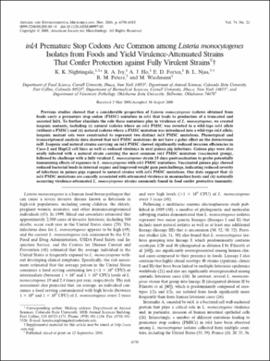| dc.contributor.author | Nightingale, K. K. | |
| dc.contributor.author | Ivy, R. A. | |
| dc.contributor.author | Ho, A. J. | |
| dc.contributor.author | Fortes, E. D. | |
| dc.contributor.author | Njaa, B. L. | |
| dc.contributor.author | Peters, R. M. | |
| dc.contributor.author | Wiedmann, M. | |
| dc.date.accessioned | 2018-08-29T14:24:27Z | |
| dc.date.available | 2018-08-29T14:24:27Z | |
| dc.date.issued | 2008-11 | |
| dc.identifier | oksd_nightingale_inlaprematurest_2008 | |
| dc.identifier.citation | Nightingale, K. K., Ivy, R. A., Ho, A. J., Fortes, E. D., Njaa, B. L., Peters, R. M., & Wiedmann, M. (2008). inlA premature stop codons are common among Listeria monocytogenes isolates from foods and yield virulence-attenuated strains that confer protection against fully virulent strains. Applied and Environmental Microbiology, 74(21), 6570-6583. https://doi.org/10.1128/AEM.00997-08 | |
| dc.identifier.uri | https://hdl.handle.net/11244/301598 | |
| dc.description.abstract | Previous studies showed that a considerable proportion of Listeria monocytogenes isolates obtained from foods carry a premature stop codon (PMSC) mutation in inlA that leads to production of a truncated and secreted InlA. To further elucidate the role these mutations play in virulence of L. monocytogenes, we created isogenic mutants, including (i) natural isolates where an inlA PMSC was reverted to a wild-type inlA allele (without a PMSC) and (ii) natural isolates where a PMSC mutation was introduced into a wild-type inlA allele; isogenic mutant sets were constructed to represent two distinct inlA PMSC mutations. Phenotypical and transcriptional analysis data showed that inlA PMSC mutations do not have a polar effect on the downstream inlB. Isogenic and natural strains carrying an inlA PMSC showed significantly reduced invasion efficiencies in Caco-2 and HepG2 cell lines as well as reduced virulence in oral guinea pig infections. Guinea pigs were also orally infected with a natural strain carrying the most common inlA PMSC mutation (vaccinated group), followed by challenge with a fully virulent L. monocytogenes strain 15 days postvaccination to probe potentially immunizing effects of exposure to L. monocytogenes with inlA PMSC mutations. Vaccinated guinea pigs showed reduced bacterial loads in internal organs and improved weight gain postchallenge, indicating reduced severity of infections in guinea pigs exposed to natural strains with inlA PMSC mutations. Our data support that (i) inlA PMSC mutations are causally associated with attenuated virulence in mammalian hosts and (ii) naturally occurring virulence-attenuated L. monocytogenes strains commonly found in food confer protective immunity. | |
| dc.format | application/pdf | |
| dc.language | en_US | |
| dc.publisher | American Society for Microbiology | |
| dc.rights | This material has been previously published. In the Oklahoma State University Library's institutional repository this version is made available through the open access principles and the terms of agreement/consent between the author(s) and the publisher. The permission policy on the use, reproduction or distribution of the material falls under fair use for educational, scholarship, and research purposes. Contact Digital Resources and Discovery Services at lib-dls@okstate.edu or 405-744-9161 for further information. | |
| dc.title | inlA premature stop codons are common among Listeria monocytogenes isolates from foods and yield virulence-attenuated strains that confer protection against fully virulent strains | |
| osu.filename | oksd_nightingale_inlaprematurest_2008.pdf | |
| dc.description.peerreview | Peer reviewed | |
| dc.identifier.doi | 10.1128/AEM.00997-08 | |
| dc.description.department | Veterinary Pathology | |
| dc.type.genre | Article | |
| dc.type.material | Text | |
| dc.subject.keywords | virulent strain | |
| dc.subject.keywords | yield | |
| dc.subject.keywords | foodstuff | |
| dc.subject.keywords | bacteria | |
